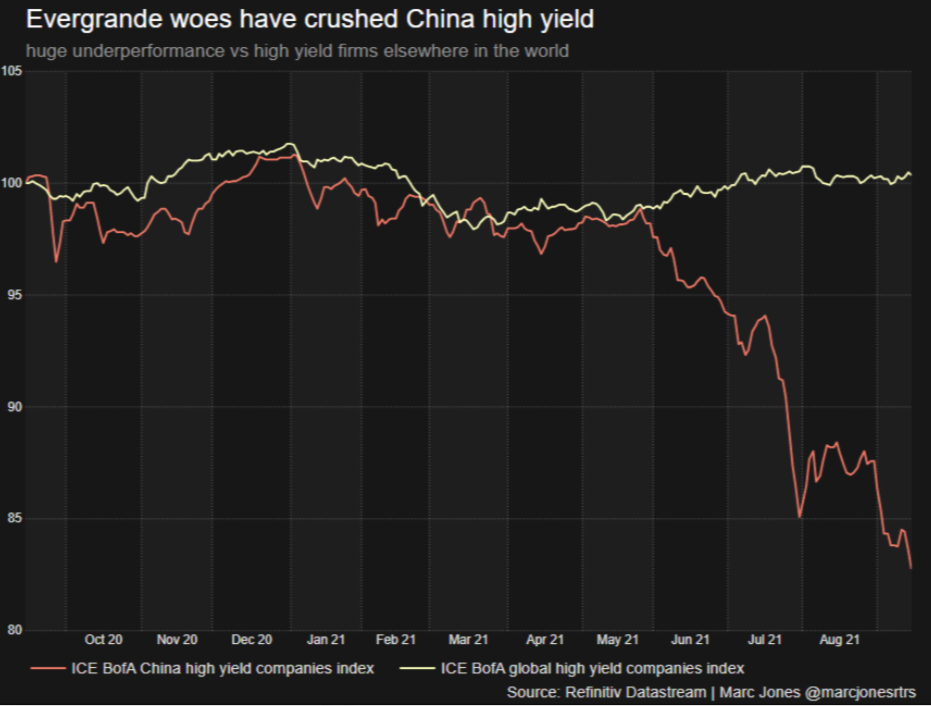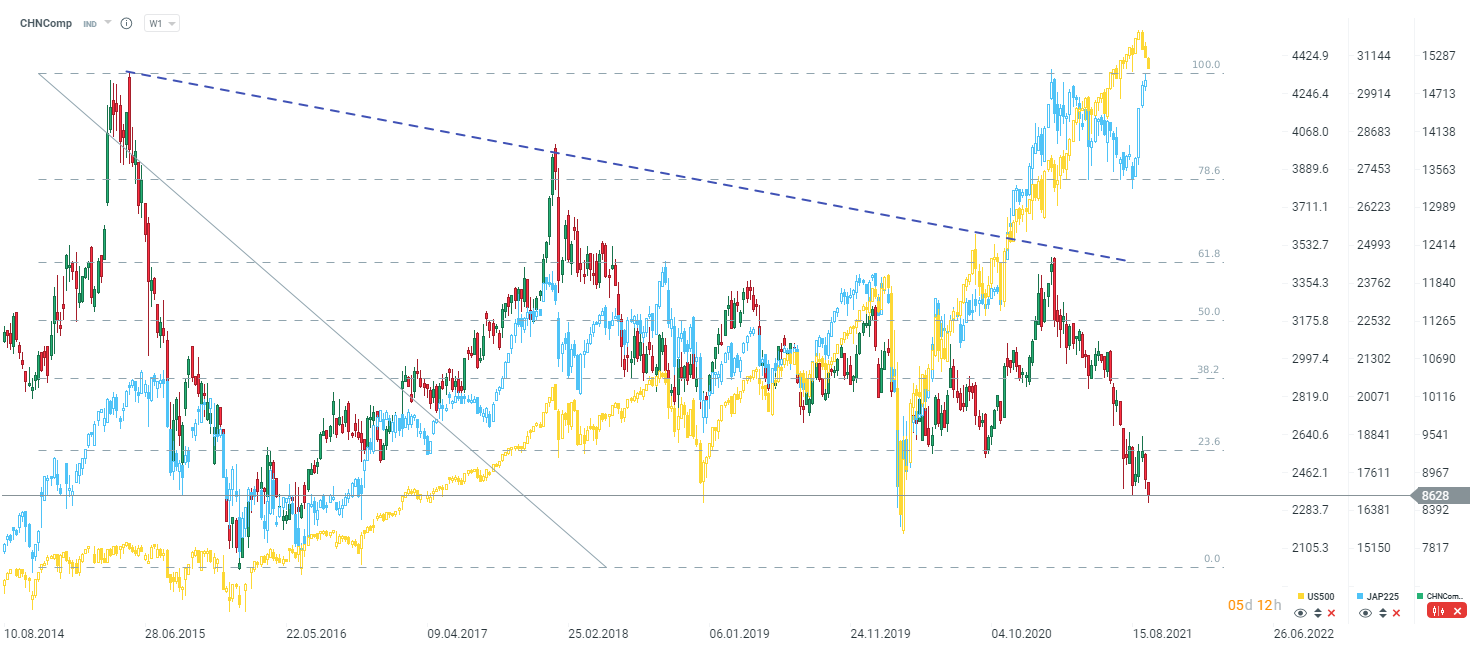-
Evergrande is the second largest property developer in China
-
Its debt amounts to around 300 billion USD
-
Company has construction of 1-1.5 million apartments in progress
-
Evergrande's shares and bonds dropped 85% over the past year
Evergrande
Evergrande is the second largest property developer in China in terms of sales. Company has almost 200 thousand employees but as much as 4 million people may be linked to the company. Over 70 thousand investors hold interest in the company, including several hundred banks and parabanks. Company has 1-1.5 million apartments in construction and manages 2.8 thousand neighborhoods in over 300 cities. Apart from that, the company is also present in healthcare, consumer products, entertainment as well as electric vehicles sectors.
Root of problems
Problems of Evergrande can be reasoned with the availability of cheap loans in China. Because of that, investors in China engaged extensively in speculation on the real estate market, like buying apartments as ways of investing. Conservative estimates suggest that as much as 18% of Chinese GDP may be linked to the real estate market. Other forecasts claim that this share may be as high as 25%. Evergrande has been highly leveraged but recent actions of the Chinese authorities made it unable to roll over its debt. While the company has managed to lower its debt by around 20% since the start of the year, other types of liabilities spiked.
How big is Evergrande's debt?
Evergrande's debt is estimated to be slightly above $300 billion. Loans and bonds make up only a quarter of this amount. The remaining part is made up of commitments to suppliers and contractors. Bonds issued abroad (in other countries than China) are worth $20 billion. While foreign debt is relatively small, it should be noted that Evergrande is one of the largest corporate bond issuers in the emerging markets. Potential collapse of Evergrande creates a real risk of default from other highly-indebted companies. Fitch says that Evergrande has to pay $129 million in interest in September alone while coupon payments needed to be paid out by the end of 2021 amount to $850 million. Bonds worth $7.4 billion are maturing next year.
 Evergrande's issues led to a big jump in financing costs for other companies with big piles of debt. Source: Reuters
Evergrande's issues led to a big jump in financing costs for other companies with big piles of debt. Source: Reuters
Is Evergrande the Chinese Lehman Brothers moment?
This is unquestionably the biggest financial risk Xi Jinping administration has faced. Regulators have warned about the situation for some time already and it has allowed Evergrande's debt to decrease. Nevertheless, collapse of such a high-profile company would likely lead to significant problems in the Chinese banking sector and may trigger more defaults in the Chinese real estate sector. On the other hand, Chinese authorities have means to prevent a crisis. There are some rumours that any help from the Chinese government will be targeted more towards banks and citizens rather than real estate companies. State-controlled bankruptcy may get out of control quickly and, without a quick support, may trigger a liquidity crisis
Markets, encouraged by Fed actions, got used to buying dips in the market. Such a potential dip may be spotted on the CHNComp (index trades near 2016 and 2020 lows). If Beijing decides to take quick action, the current sell-off may be used by bulls as an opportunity to enter the market at favourable levels. However, traders should keep in mind that the resulting liquidity crisis could have serious consequences not only on the Chinese market but also abroad. China has shown numerous times that unlike in the case of the Fed, market sentiment is not its top priority.
 Hang Seng (CHNComp) has been dropping hard in the past few months. Share of Evergrande and other real estate companies in the index is rather limited, especially at current valuations. Should the Chinese state support banks and citizens, the collapse of Evergrande does not need to be as bad. China may try to use the situation to lower house prices and make them more affordable for those that need a home, not an investment. Source: xStation5
Hang Seng (CHNComp) has been dropping hard in the past few months. Share of Evergrande and other real estate companies in the index is rather limited, especially at current valuations. Should the Chinese state support banks and citizens, the collapse of Evergrande does not need to be as bad. China may try to use the situation to lower house prices and make them more affordable for those that need a home, not an investment. Source: xStation5
Market overview: PMI shapes European markets🚨
Morning wrap (23.01.2026)
US Open: Rebound attempt on Wall Street 📈Meta Platforms surges 3.5%
VIX sell-off deepens amid rebound on Wall Street 📉
The content of this report has been created by XTB S.A., with its registered office in Warsaw, at Prosta 67, 00-838 Warsaw, Poland, (KRS number 0000217580) and supervised by Polish Supervision Authority ( No. DDM-M-4021-57-1/2005). This material is a marketing communication within the meaning of Art. 24 (3) of Directive 2014/65/EU of the European Parliament and of the Council of 15 May 2014 on markets in financial instruments and amending Directive 2002/92/EC and Directive 2011/61/EU (MiFID II). Marketing communication is not an investment recommendation or information recommending or suggesting an investment strategy within the meaning of Regulation (EU) No 596/2014 of the European Parliament and of the Council of 16 April 2014 on market abuse (market abuse regulation) and repealing Directive 2003/6/EC of the European Parliament and of the Council and Commission Directives 2003/124/EC, 2003/125/EC and 2004/72/EC and Commission Delegated Regulation (EU) 2016/958 of 9 March 2016 supplementing Regulation (EU) No 596/2014 of the European Parliament and of the Council with regard to regulatory technical standards for the technical arrangements for objective presentation of investment recommendations or other information recommending or suggesting an investment strategy and for disclosure of particular interests or indications of conflicts of interest or any other advice, including in the area of investment advisory, within the meaning of the Trading in Financial Instruments Act of 29 July 2005 (i.e. Journal of Laws 2019, item 875, as amended). The marketing communication is prepared with the highest diligence, objectivity, presents the facts known to the author on the date of preparation and is devoid of any evaluation elements. The marketing communication is prepared without considering the client’s needs, his individual financial situation and does not present any investment strategy in any way. The marketing communication does not constitute an offer of sale, offering, subscription, invitation to purchase, advertisement or promotion of any financial instruments. XTB S.A. is not liable for any client’s actions or omissions, in particular for the acquisition or disposal of financial instruments, undertaken on the basis of the information contained in this marketing communication. In the event that the marketing communication contains any information about any results regarding the financial instruments indicated therein, these do not constitute any guarantee or forecast regarding the future results.


